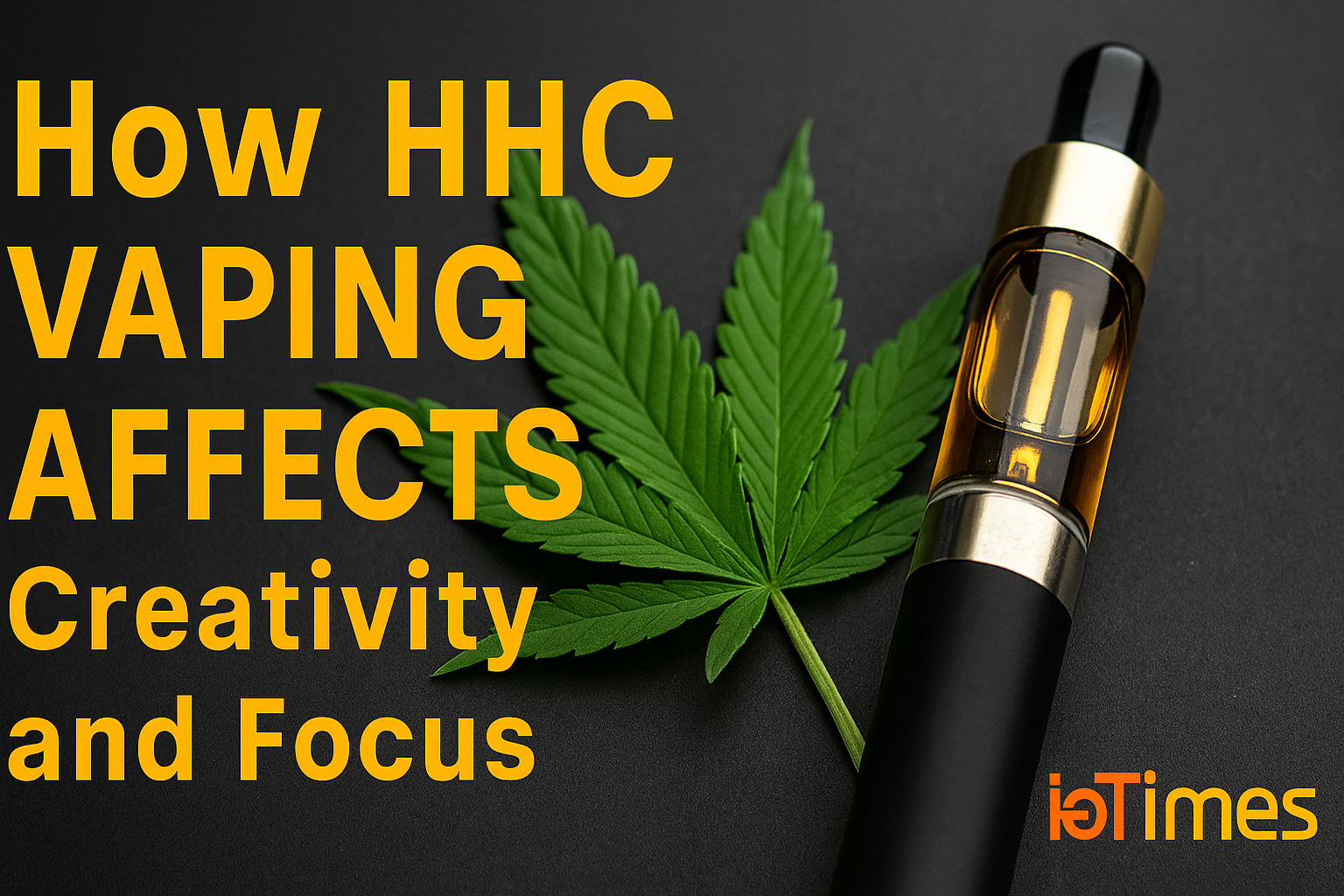Hexahydrocannabinol (HHC) is a semi-synthetic cannabinoid that’s gaining attention among creatives, students, and wellness seekers alike. It’s being marketed as a middle ground between CBD and THC—a compound that may provide mild euphoria without overwhelming cognitive effects. But how does it actually affect creativity and focus? Is it the productivity hack it’s touted to be, or just another overhyped trend?
This in-depth article explores the science, user experiences, risks, and practical tips surrounding HHC vaping and its potential impact on mental performance.
What is HHC?
HHC (Hexahydrocannabinol) is a hydrogenated form of THC. It was first created in 1944 by chemist Roger Adams through a process known as hydrogenation. HHC is found in trace amounts in cannabis plants, but commercial products use lab-synthesized versions derived from hemp.
The compound is known to bind with the CB1 receptors in the endocannabinoid system—the same way THC does. The major difference? HHC is said to produce a milder, less anxious high, with fewer side effects like paranoia.
Legal Status (As of 2025)
The legality of HHC is in flux. In the U.S., HHC exists in a gray area due to the 2018 Farm Bill, which legalized hemp-derived cannabinoids. However, several states have moved to ban it. Globally, the United Nations Commission on Narcotic Drugs added HHC to its list of controlled substances in 2025, prompting countries to reassess its legal standing.
Mechanism of Action
HHC activates the CB1 and CB2 receptors in the brain and immune system. This interaction leads to the release of dopamine and other neurotransmitters. Some effects are:
- Mild euphoria
- Enhanced sensory perception
- Reduced anxiety
- Altered time perception
Unlike CBD, which has little to no psychoactive effects, or THC, which can be overwhelming at higher doses, HHC offers a subtler cognitive shift that some users describe as “clear-headed.”
HHC vs. THC and CBD
| Property | HHC | THC | CBD |
|---|---|---|---|
| Psychoactivity | Mild | High | None |
| Legality (2025) | Gray Area / Banned in some states | Legal in regulated markets | Legal |
| Effect on Focus | Mild Impairment or Enhancement | Impairment at high doses | Potential enhancement |
| Effect on Creativity | Variable | Can enhance or impair | Minimal direct effect |
Scientific Research on HHC and Cognition
While long-term studies on HHC are limited, emerging research offers insights:
- A 2023 study in Scientific Reports showed that HHC binds to CB1 receptors similarly to THC, leading to comparable psychoactive effects.
- Another study published in Cannabis and Cannabinoid Research surveyed 109 HHC users and found that 55% reported enhanced relaxation, and 20% noted improved focus. However, 17% experienced side effects like anxiety.
- WebMD and Health Canada note that cannabis-related compounds generally impair short-term memory and attention, especially at higher doses.
These findings suggest that HHC might offer a balanced experience—capable of aiding creative exploration while minimizing the risk of cognitive overload.
Creativity: Can HHC Help?
Creativity involves divergent thinking, free association, and novel idea generation. Users often report that HHC:
- Helps them break mental blocks
- Enhances imaginative thinking
- Encourages abstract reasoning
User Testimonials
- “A small vape dose of HHC helps me brainstorm ideas for my painting without feeling spaced out.”
- “I feel like I’m able to think outside the box more, without the paranoia that comes with weed.”
Scientific Perspective
Research from Psychology Today notes that low doses of cannabinoids may enhance divergent thinking, while high doses impair it. HHC, when taken in moderation, appears to strike a balance by offering a euphoric yet functional mental state.
Focus: Can HHC Improve Concentration?
Focus requires working memory, sustained attention, and minimal distractions. Anecdotally, some users say that HHC helps:
- Reduce anxiety-driven distractions
- Induce a state of “calm focus”
- Make monotonous tasks more engaging
But There Are Caveats
According to Health Canada, THC and related cannabinoids can:
- Impair cognitive flexibility
- Disrupt short-term memory
- Lower task accuracy
Because HHC has similar pharmacodynamics to THC, these risks likely apply at higher doses. Focus enhancement may occur only in low, controlled doses.
Ideal Use Cases
HHC May Help:
- Writers experiencing creative block
- Artists during sketching or idea generation
- Programmers during non-critical brainstorming
HHC May Hinder:
- Students cramming for exams
- Professionals doing high-stakes tasks
- Activities requiring precision or memory retention
Benefits and Drawbacks
Benefits
- Mild euphoria without heavy sedation
- Fewer reports of anxiety or paranoia
- Enhanced sensory perception
- Possible enhancement of creativity and mild focus
Drawbacks
- Possible cognitive impairment at higher doses
- Legal uncertainties
- Potential for dependency
- Unknown long-term health effects
Tips for Safe and Effective Use
- Start Low: Begin with 1–2 puffs or a low-dose edible (5 mg or less).
- Use in Safe Environments: Avoid using before critical work or public engagements.
- Pair with Mindful Activities: Combine with journaling, music, or brainstorming.
- Track Your Response: Keep notes on how your cognition changes post-use.
- Avoid Daily Use: Prevent tolerance and potential dependency.
Safety and Legal Considerations (2025)
- Driving: Avoid operating machinery under the influence.
- Drug Testing: HHC may result in a positive THC test.
- Quality Control: Choose lab-tested products to avoid contaminants.
- Legal Risks: Some jurisdictions have banned HHC; always verify local laws.
Expert Insights
- Dr. David Streem, Cleveland Clinic: Notes that HHC and THC share similar risks, especially regarding cognitive function.
- V. Krishna Kumar, Cognitive Scientist: Suggests cannabinoids might increase the perception of creativity without measurable improvement.
Conclusion
HHC occupies a unique space in the cannabinoid family. For some, it offers a light euphoria that can help loosen mental constraints and spur creativity. For others, it may induce mild cognitive impairment that hinders productivity.
The key lies in intentional, moderate use. When dosed carefully and used in appropriate settings, HHC vaping might be a valuable tool for creative exploration or anxiety reduction. However, it’s not a guaranteed booster for all users or tasks.
Until more peer-reviewed studies are available, consider HHC an experimental aid—one that should be used with mindfulness, responsibility, and an awareness of its limitations.
Read Also: Flexport JAX: Optimize Freight Through Jacksonville’s Port




